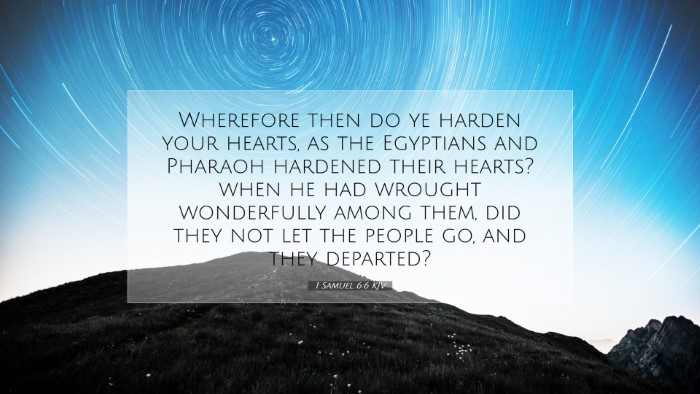Commentary on 1 Samuel 6:6
Verse Reference: 1 Samuel 6:6 - "Wherefore then do ye harden your hearts, as the Egyptians and Pharaoh hardened their hearts? When he had wrought wonderfully among them, did they not let the people go, and they departed?"
Introduction
The verse presents a pivotal moment in the narrative of 1 Samuel, highlighting the response of the Philistines to the plagues sent upon them as a consequence of capturing the Ark of the Covenant. The comparison to Pharaoh and Egypt serves as a cautionary example, emphasizing the danger of hardening one's heart against divine intervention.
Contextual Analysis
This passage occurs after the Philistines have suffered severe affliction due to the presence of the Ark among them. The wisdom of the Philistine leaders is called into question; they are urged to reflect on the consequences faced by Pharaoh. The use of historical precedent serves not only as an admonition but also as a profound teaching moment.
Insights from Public Domain Commentaries
Matthew Henry's Commentary
Matthew Henry emphasizes the folly of hardening one’s heart against God, drawing parallels to the Egyptians during the Exodus. He notes that the grievous plagues should have led the Philistines to repentance and humility rather than rebellion. Henry asserts that “the heart of man must be soft and pliable, willing to yield to God’s designs and purposes.”
- Repentance Required: Henry argues that true repentance must involve recognizing one's guilt and the need for divine mercy. The hardness of heart in the face of evidence of God's power leads to a rejection of His grace.
- The Nature of Divine Will: He further comments on how God’s interventions, whether in grace or judgment, require a response from humanity. The Philistines had a chance for redemption but chose self-deception and defiance.
Albert Barnes' Commentary
Albert Barnes provides a thorough examination of the implications of hardening one’s heart, asserting that ignorance is no excuse before God. He clarifies that the Philistines, being aware of the history of God’s judgment upon Egypt, should have acted wisely by heeding the warning of their elders.
- Historical Awareness: Barnes stresses the importance of historical awareness in understanding God's character. The Philistines had seen God’s hand demonstrated through miraculous signs, and yet they exhibited a stubborn resistance.
- Divine Sovereignty: His insights also touch upon the themes of divine sovereignty and human responsibility—how the knowledge of God's actions demands a response that aligns with reverence and submission to Him.
Adam Clarke's Commentary
Adam Clarke delves into the cultural and theological implications of the Philistines' actions. He discusses the character of Pharaoh's heart and contrasts it with the current scenario faced by the Philistines. Clarke poignantly notes how both parties ignored evident signs of divine power, leading them to tragic outcomes.
- Comparative Study: Clarke’s comparison to Pharaoh serves not only as a warning but as an exploration into the mechanics of divine judgment and mercy. The Philistines had the opportunity to avoid Pharaoh's fate but failed to heed the warning.
- Spiritual Wisdom: He highlights the importance of spiritual wisdom, urging readers to recognize God’s hand in their lives and to respond promptly to His guidance and correction.
Theological Implications
Theological reflection on 1 Samuel 6:6 leads to profound insights regarding the nature of God’s judgment and human agency. The repeated theme of hardening hearts throughout Scripture emerges as a critical study of human sinfulness juxtaposed against divine holiness.
Human Responsibility
These commentaries illuminate the theological premise that humanity is responsible for their responses to God. The encouragement to avoid the path of stubbornness and pride resonates deeply with pastoral ministry and spiritual leadership. Pastors are reminded to lead congregations away from paths of unyielding hearts and towards repentance.
Historical Precedent as Teaching Tool
The historical reference to Egypt acts as a reminder of the necessity of learning from the past. The use of past events serves as divine pedagogy, teaching current generations about the consequences of rebellion against God.
Conclusion
1 Samuel 6:6 serves as a powerful admonition against the hardening of one's heart in the face of divine revelation and action. The insights drawn from Matthew Henry, Albert Barnes, and Adam Clarke provide a comprehensive understanding of the importance of spiritual responsiveness, the need for humility before God, and the enduring consequences of pride. For pastors, students, theologians, and scholars, this verse encapsulates the need for a continuous evaluation of one’s spiritual posture before the Almighty.


